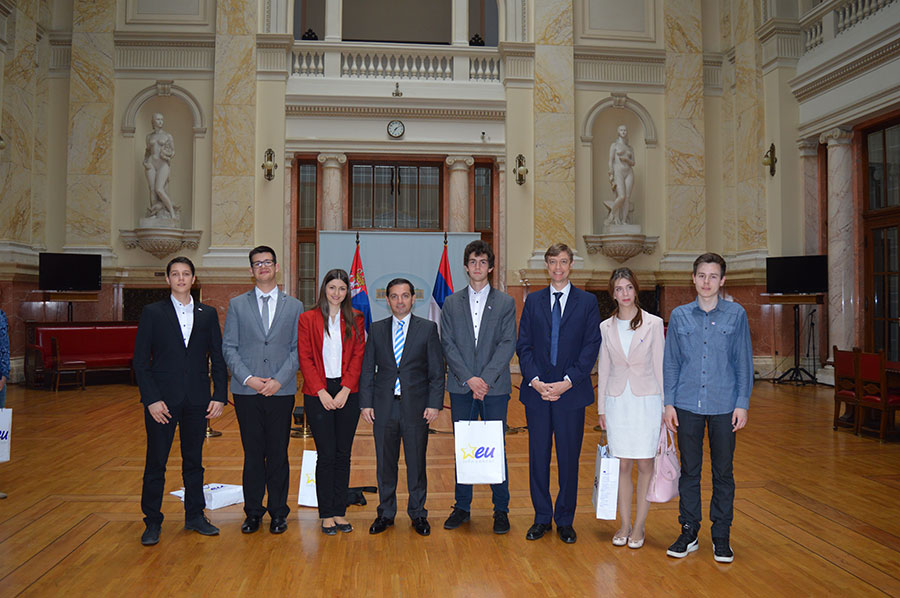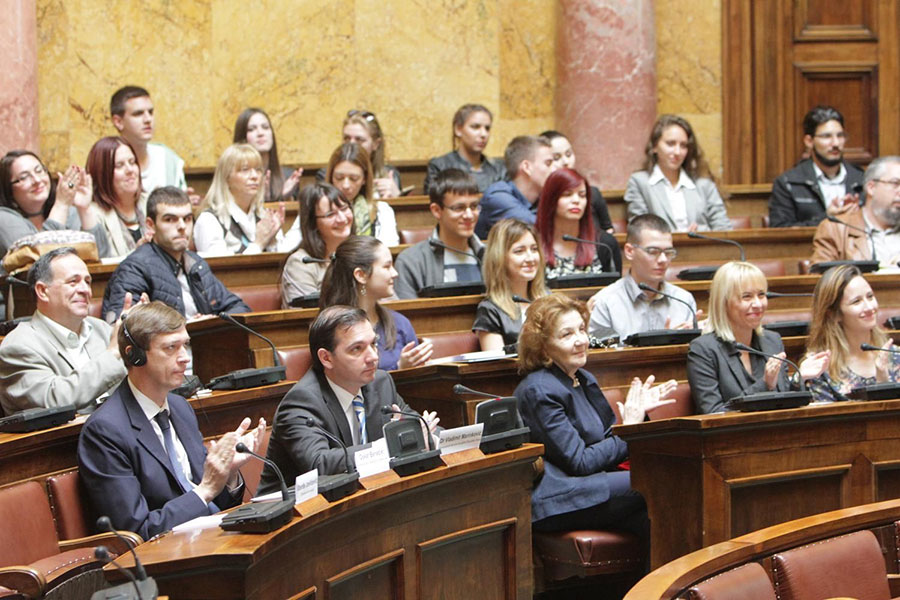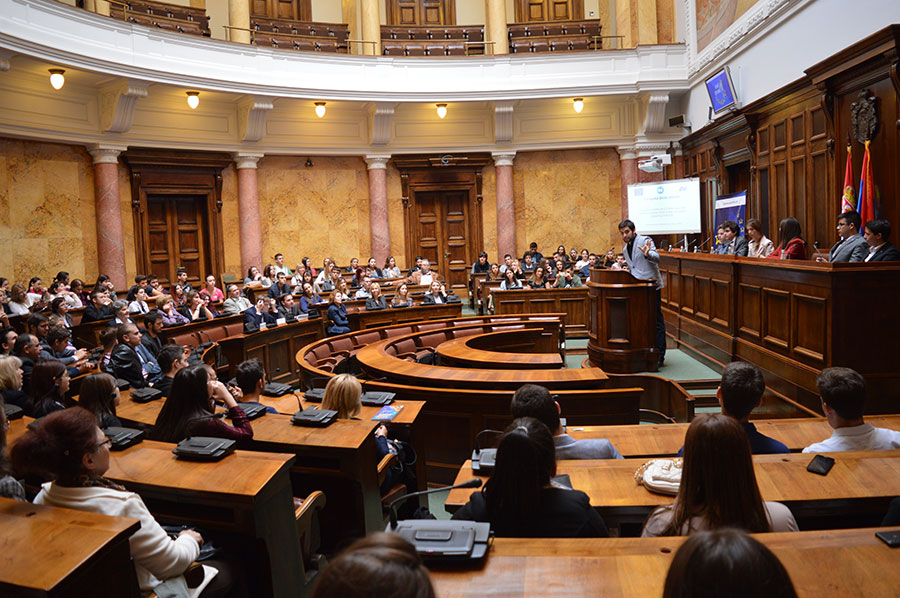Today, the EU Delegation to Serbia, EU Info Centre and Open Communication organised the final debate within European Debate School contest titled «This House believes the EU should expand free movement of workers to the Western Balkans countries» at the National Assembly of Serbia.
It was the final event of the European Debate School contest which ran from November 2015-May 2016. 165 participants applied for the contest, high school students from throughout Serbia (Nis, Novi Sad, Kragujevac, Krusevac, Becej, Pecinci, Paracin, Jagodina, Odzaci and Belgrade) 30 out of which have been selected to compete. Before the final round in Belgrade, debates had taken place in Novi Sad, Nis, Becej and Paracin.
The final debate, held at the National Assembly of Serbia, divided the participants into two three-member teams, whereas the jury was composed of Deputy Head of the EU Delegation to Serbia Oskar Benedikt, Deputy Speaker of the National Assembly Vladimir Marinkovic and Djordje Jovicevic of Open Communication.
Goal of the Project, running in Serbia for three consecutive years, is to spark the interest in debating among youth, as a growingly popular method for development of critical thinking skills. While debating, participants were not supposed to express their own views, but to represent their team’s stance as convincingly as possible.
“Migrants fill scarce jobs in European labour markets”
 The team advocating that the Western Balkans countries should be included in free movement of workers – Nadja Milosevic, Nikola Tucakov and Aleksandar Radivojevic – argued that European economies were in need of fresh work force and that workers from the region would adopt European standards even before their country has joined the EU.
The team advocating that the Western Balkans countries should be included in free movement of workers – Nadja Milosevic, Nikola Tucakov and Aleksandar Radivojevic – argued that European economies were in need of fresh work force and that workers from the region would adopt European standards even before their country has joined the EU.
Nadja Milosevic said “work force migration is falsely thought of as guilty of increased unemployment, but the truth is migrants often fill high demand scarce jobs on EU Member States’ labour markets.”
Nikola Tucakov said such measure could enable the development of business ties and bring citizens closer to EU single market. “Money is not the only motive. Family and cultural ties would prevent people from mass resettlement. Current status quo opens up the possibility for the creation of shadow labour market due to which people try to find any job in the EU which is bad not only for workers themselves, but also for the rule of law,” Tucakov said.
Aleksandar Radivojevic said workers should be sent back to their countries if they failed to find a job within three months. “According to the data by Office for Cooperation with Diaspora, EUR4 billion flow into Serbia annually in the form of money people who work abroad send to their families in Serbia. This way, we are strengthening the purchasing power of citizens and foster production which in turn further strengthens our country’s economy,” said Radivojevic.
“Even more people would leave the country and lose motivation for EU membership”

FoNet
“Opposition” team, composed of Ana Vesic, Nikola Stankovic and Uros Pajcin, argued that the Western Balkans inclusion in the free movement of workers would cause a brain drain in Serbia. Team, however, argued people should be encouraged to stay in their country, noting that EU workers do not look sympathetically on workers hailing from the Balkans because of their overall negative attitude towards migrants and the belief that migrants take away their jobs and reduce costs of labour.
Ana Vesic said EU citizens believed that accumulation of labour lowered their wages. “Having to accept lower wages is what EU citizens are afraid of, even such perception differs from reality,” Ana Vesic said.
Nikola Stankovic said business ties were already in place and claiming that our citizens were not familiar with the EU market was false, because our trade relations with the Union were already well-developed. “Over 30,000 people leave Serbia annually as it is; in the event of such measure, even more people would leave the country. Also, people will lose interest in the EU, because the EU would be getting cheaper work force, whereas candidate countries would be left with insufficient number of experts and workers,” said Stankovic.
Uros Pajcin argued that including the Western Balkans countries in free movement of workers would “reduce the number of quality workers and particularly critical mass necessary to control the work of politicians by doing their day-to-day jobs.”
“Free movement of workers controversial subject in the EU as well“
The debate at the Small Hall of the National Assembly was attended by 150 high school students from Nis, Paracin, Belgrade, Pancevo and Becej.
Opposition team won the debate thanks to the votes of the audience and two members of the jury, Djordje Jovicevic and Vladimir Marinkovic, who assessed that the possibility of finding a job in the EU would come in time, but was not necessary at the moment, given the fact that Serbia loses 30,000 people annually as it is. In the coming period, Serbia’s need for a work force that would drive the economy forward and implement reforms on the EU path will be on the rise.
Member of the jury Oskar Benedikt voted in favour of free movement of workers, even though he noted Brussels considered brain drain to be the key as it lowered domestic potential and added that the issue was controversial in the EU as well and the trigger for the UK referendum.




